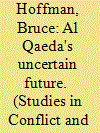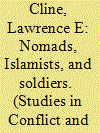| Srl | Item |
| 1 |
ID:
122424


|
|
|
|
|
| Publication |
2013.
|
| Summary/Abstract |
This article considers the current state of the Al Qaeda terrorist movement and its likely future trajectory. It considers the principle assumptions both today and in the past about Al Qaeda and how they affect our understanding of the movement and the threat that it poses; Al Qaeda's current capacity for violence; and its ability to plan strategically and implement terrorist operations. The article further identifies nine key change drivers that will likely determine Al Qaeda's fate in the years to come before concluding that, even while the core Al Qaeda group may be in decline, Al Qaeda-ism, the movement's ideology, continues to resonate and attract new adherents. In sum, it argues that Al Qaeda remains an appealing brand most recently and most especially to extremist groups in North and West Africa and the Levant.
|
|
|
|
|
|
|
|
|
|
|
|
|
|
|
|
| 2 |
ID:
122426


|
|
|
|
|
| Publication |
2013.
|
| Summary/Abstract |
The interview that follows was conducted somewhere in Italy with a militant of the Red Brigades recently freed after spending 32 years and 6 months in prison. Taking up the sociological perspective of Max Weber, the author draws a distinction between "professional terrorist" and "vocational terrorist". The terrorist by vocation differs from the professional terrorist in his profound faith in the mission he feels he must accomplish. He does not try to improve his social status and is not interested in the selfish pursuit of personal well-being. He gives up love, family, children and friendship. When he decides to join a terrorist group, he voluntarily severs any contact with his former life. He is a high school or university graduate and might choose a secure life and a good job but prefers to kill, accepting the risk of dying. The vocational terrorist is the terrorist in his incandescent state.
|
|
|
|
|
|
|
|
|
|
|
|
|
|
|
|
| 3 |
ID:
122425


|
|
|
|
|
| Publication |
2013.
|
| Summary/Abstract |
The relationship between far right extremism and military involvement is a complex problem and the dynamics that explain this relationship are not well understood. The present article addresses this gap by discussing the relationship between military experience, identity discrepancies, and far right terrorism. This article proposes that identity discrepancies occur when individuals experience involuntary role exits from the military or when individuals perceive that personal achievements earned while enlisted are unrecognized or unappreciated. Identity discrepancies may facilitate a change in behavior toward far right extremism and eventually terrorism. Case study examples are provided to illustrate this relationship.
|
|
|
|
|
|
|
|
|
|
|
|
|
|
|
|
| 4 |
ID:
122423


|
|
|
|
|
| Publication |
2013.
|
| Summary/Abstract |
Mali has been faced with a series of uprisings by its Tuareg over a number of years. Although each of these rebellions was ended by a cease-fire, the Malian government never succeeded in instituting longer term peace agreements. The 2012 Tuareg rebellion has presented even more significant security threats. The environment in northern Mali now is marked by multiple armed groups, with multiple competing agendas. This complex situation, with Tuareg rebels, Islamists with varying goals, and local militias, with a pattern of varying levels of cooperation and conflict, will at best be very difficult to resolve in the long term. Combined with an almost complete security vacuum in northern Mali on the part of the government, this situation could be intractable even with external intervention. At the same time, the focus on counterterrorism in northern Mali may not be conducive to a long-term resolution of what in reality is a much more complicated security environment.
|
|
|
|
|
|
|
|
|
|
|
|
|
|
|
|